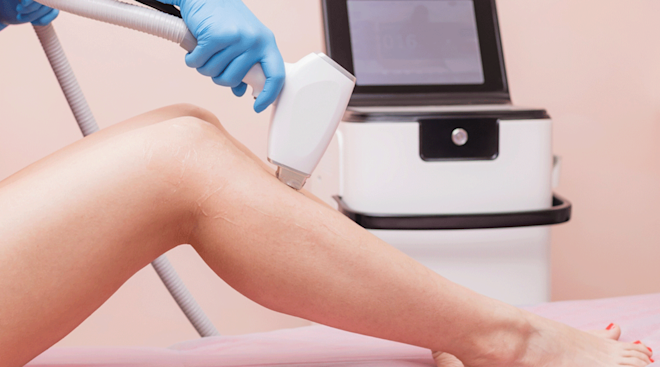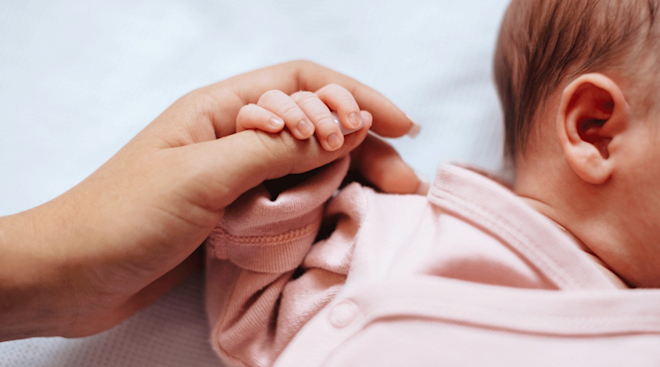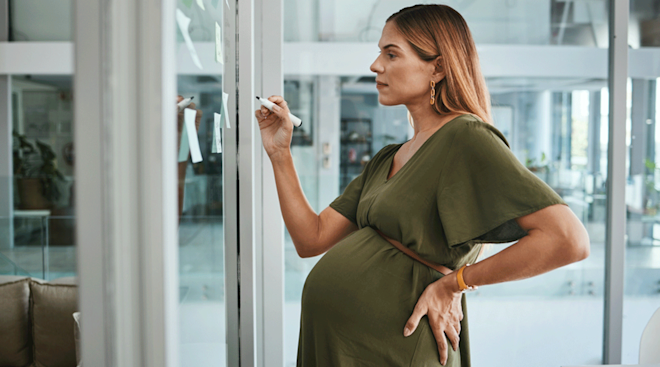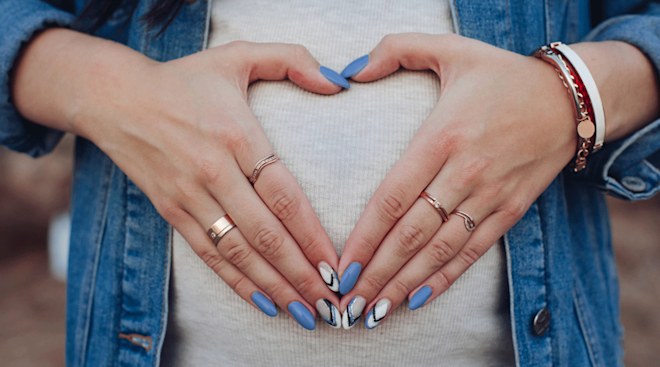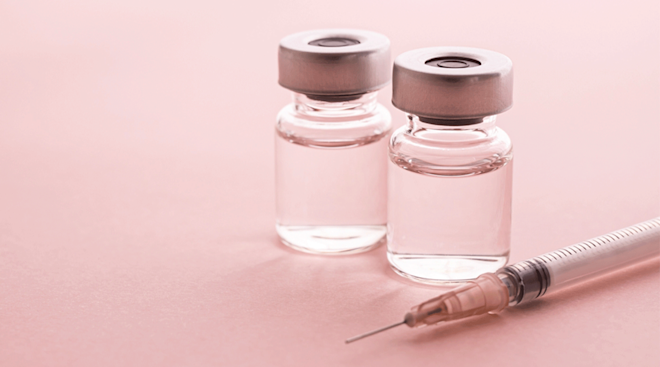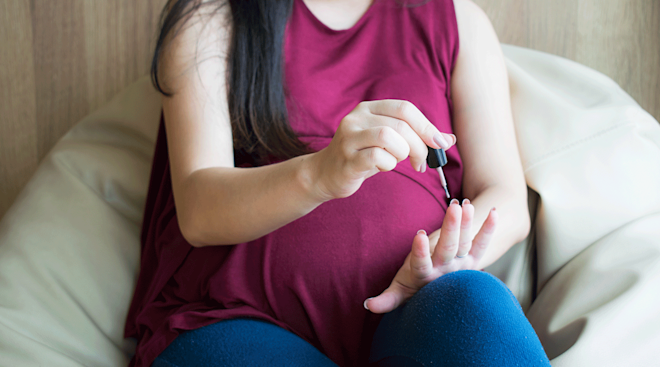The Lowdown on Getting a Tattoo While Pregnant
Tattoo lovers choose new designs to commemorate all types of occasions: Celebrating a milestone birthday, remembering a loved one or honoring a new commitment, like a marriage. But can you get a tattoo while pregnant? There’s no definitive rule against it, but most doctors advise waiting until after baby has made their big debut. There’s a host of potential consequences to consider with tattoos and pregnancy, so you’ll want to think long and hard before making a permanent and potentially risky decision. Here’s what to know about getting a tattoo while pregnant.
There aren’t many studies that delve into tattoos and pregnancy, and there are no formal guidelines around this question. But doctors strongly discourage pregnant people from visiting the tattoo parlor before baby’s arrival. “It’s generally not recommended to get a tattoo while pregnant, since there isn’t an urgent reason to do so, and it may even complicate your pregnancy unnecessarily,” says Jill Purdie, MD, medical director at Northside Women’s Specialists in Georgia.
The truth is that getting a tattoo during pregnancy is a sort-of gray area. It’s not a hard no, but it’s certainly not a clear-cut yes. And there are several risks you should know about before getting inked. Here, the most common potential problems:
Possible infection
“The main concern is risk to the developing fetus from an infection contracted during the tattoo, or in the weeks following while your skin heals,” says Deanne Mraz Robinson, MD, president and co-founder of Modern Dermatology in Westport, Connecticut. And even a single infection could have major consequences. “If the tattoo artist uses non-sterile or contaminated needles, a woman may risk exposing herself and her fetus to infections such as Hepatitis B, Hepatitis C and HIV. All of these infections can be passed from the pregnant person to the fetus and can have lifelong effects,” adds Purdie. What’s more, your ability to fight off infections may be compromised when you’re expecting. "A pregnant person’s immune system is weaker than when they’re not pregnant,” notes Purdie. This may increase the risk of skin infections at the tattoo site itself or even delay healing.
Safety of dyes and inks
"Tattoos place ink into the dermis layer of our skin, which is made up of connective tissue and contains blood vessels, nerve endings and sweat glands,” explains Robinson. “When the ink is placed here it enters the bloodstream.” There simply isn’t sufficient evidence to show that the inks and dyes used in tattoos are safe to a developing baby.
Skin changes and sensitivity
During pregnancy, your skin is more sensitive to pain, and it’s also more easily irritated. This may exacerbate your risk of having a reaction to the ink from the tattoo and increase the pain you experience during the actual tattooing process, says Purdie. There’s also a practical consideration: You’ll likely experience some pregnancy-related skin changes in the coming weeks and months. “Depending on its location, the tattoo may look different when done during pregnancy than when you’re no longer pregnant, due to weight changes and skin stretching,” says Purdie.
Epidurals and lower back tattoos
If you already have a tattoo on your lower back, you may be wondering if it’s safe to receive an epidural during labor. Although the research is limited, doctors generally consider it safe. Purdie notes that there is a potential risk of trapping some of the pigment from the tattoo within the needle that’s being used to do the epidural—and then introducing that pigment into the epidural space (the area around the spinal cord). "The concern is that this small amount of pigment might cause a neurological issue for the patient,” she says, noting that no complications of this nature have actually been reported. She adds that anesthesiologists are typically able to make modifications to work around your tattoo. “They can avoid placing the needle directly through the ink by going through a pigment-free area or altering their technique,” she says. That said, address any questions you have about existing back tattoos with your ob-gyn and anesthesiologist.
Both Purdie and Robinson strongly recommend against getting tattoos during pregnancy, but if you’re committed to moving forward and looking to reduce risks, you’ll want to take some precautions. They’re not really any different than steps you’d want to take if you weren’t pregnant though. “Go to a reputable tattoo parlor, and make sure the needles have been sterilized and that the ink and other instruments have not been used before,” says Purdie. You’ll also want to make sure to keep the tattoo clean and covered until it’s completely healed. Finally, it’s important to know that many tattoo artists won’t work on people who are visibly pregnant, and they may even ask you to sign a waiver that states you aren’t currently expecting.
Hoping to get rid of a tattoo before baby’s arrival? Once again, you’ll want to wait. Tattoo removal isn’t a necessary procedure, and there’s not enough data to know for certain what could happen. There are some potential risks to tattoo removal during pregnancy, such as:
Reduced immunity
A pregnant person’s compromised immune system doesn’t mix well with a laser procedure. "Laser tattoo removal works by using the laser’s energy to break up the tattoo ink into tiny particles that the body then absorbs, filters out and releases,” explains Robinson. The immune system plays an important role in this process, and the immune system is already working overtime to protect Mom and baby. Suffice it to say, you wouldn’t want to choose to tax it even more with an elective procedure like tattoo removal.
Breakdown of dyes and inks
Again, the ink is a potential cause for concern. “During tattoo removal, that ink is broken down and circulates in the body; we don’t know for sure if these particles can penetrate the placental barrier,” says Robinson.
Increased risk of scarring
There’s a chance that you might trade your tattoo for another permanent reminder. “Since the skin is more sensitive during pregnancy, tattoo removal may lead to increased scarring or skin breakdown during the removal process,” says Purdie.
All things considered, getting a tattoo while pregnant is just not worth the risk. With a baby on the way, you have ample excitement in your life, so it’s best to delay any appointments or removal procedures until after their arrival. And then, if you’d like, go ahead and plan a new tattoo to celebrate their entrance into the world!
Please note: The Bump and the materials and information it contains are not intended to, and do not constitute, medical or other health advice or diagnosis and should not be used as such. You should always consult with a qualified physician or health professional about your specific circumstances.
Plus, more from The Bump:
Deanne Mraz Robinson, MD, FAAD, is a cosmetic fellowship-trained, board-certified dermatologist with award-winning experience in medical, surgical and cosmetic dermatology. She received her MD from the University of Rochester School of Medicine and Dentistry, and completed her residency at Yale-New Haven Hospital, where she served as chief resident and director for the Yale Resident Cosmetic Clinic.
Jill Purdie, MD, is an ob-gyn at Northside Women's Specialists. She received her medical degree from the Medical College of Georgia and completed her residency at Memorial Health University Medical Center.
Learn how we ensure the accuracy of our content through our editorial and medical review process.
Navigate forward to interact with the calendar and select a date. Press the question mark key to get the keyboard shortcuts for changing dates.


































